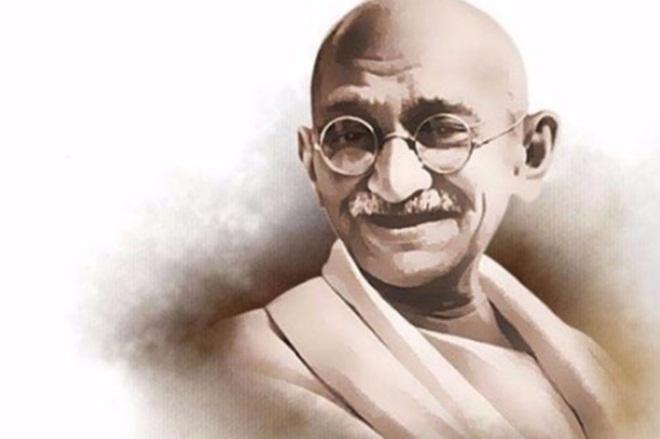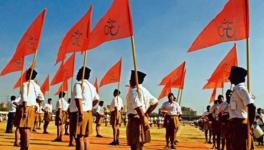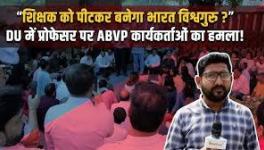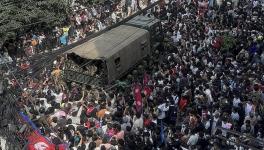Revisiting the Role of Saffron Forces in Gandhi’s Murder

Image Coutesy: The Financial Express
Saffron forces today are rewriting the popular history of India, erasing their crimes, and exaggerating their exploits. One major blot on the record of the Hindutva groups is their role in Mahatma Gandhi’s murder – which they are now attempting to erase. This process involves limiting the liability to his killer, Nathuram Godse, and his colleagues – and at the same time distancing the role and actions of other, most historically useful leaders such as Savarkar, Golwalkar, and Syama Prasad Mookerjee, among others. Those rescued from the taint are then moulded into great freedom fighters, ideologues and statesmen.
The case of Mookerjee is useful for understanding the process. He has been repackaged as a moderate who dissociated from the Hindu Mahasabha at the time Gandhi’s murder so as to cleanse, in turn, the image of the Jan Sangh (the party he later founded).
Here is what Mookerjee’s Wikipedia entry says:
“Prime Minister Jawaharlal Nehru inducted Mukherjee into the Interim Central Government as a Minister for Industry and Supply on 15 August 1947. Mukherjee began to have differences with Mahasabha after the assassination of Mahatma Gandhi, in which the organisation was blamed by Sardar Patel for creating the atmosphere that led to the killing. Mukherjee suggested the organisation suspend its political activities. Shortly after it did, in December 1948, he left.”
What is more disturbing is that the Wikipedia entry cites published books (without page numbers) to back up these claims: Indian Political Thought by SK Sharma and Urmila Sharma, Kedar Nath Kumar’s Political Parties in India, Their Ideology and Organisation, and even a book by Shamsul Islam.
However, archival evidence shows a rather different picture – that Mookerjee was nonchalant towards rising saffron violence on the eve of Gandhi’s murder and refused to denounce it.
The piece looks into letters of correspondence (from August 1947 to August 1948) between Jawaharlal Nehru and Mookerjee, then a Cabinet Minister in the interim government. Nehru had written to Mookerjee on several occasions, highlighting his alarm at the Rashtriya Swayamsevak Sangh (RSS) and Hindu Mahasabha activities which involved undermining law and order, collecting arms, attacking villages and individuals (August 1947- January 1948), as well as delegitimising the government on communal grounds and blatant sedition (in late January 1948 outside Birla House, right before Gandhi’s murder) demanding the hanging of Patel, Nehru and Maulana Azad.
After the assassination and the banning of private armies, Nehru appealed once more to Mookerjee asking him to disown the politics of communal, who refused to disavow, denounce, disown the Hindu Mahasabha, and offered to resign from the Cabinet instead, putting party before country.
Even after Independence, saffron forces were creating disorder and indulging in rioting, despite the Muslim League’s departure. RSS and Mahasabha leaders were making speeches demanding the overthrow of the “anti-Hindu” Congress, in spite of Nehru giving the Mahasabha a seat in the Cabinet. The mandates of the Mahasabha often conflicted with the basic tenets of the newly independent state – such as maintaining public safety.
In this context, Nehru’s first letter on the topic (dated September 28,1947) reads:
When I invited you to join the Cabinet, you made it clear to me that you would continue to remain in the Hindu Mahasabha.I replied that of course you could remain in the Hindu Mahasabha. So far as I remember there was no mention of you joining the Cabinet as a representative of the Hindu Mahasabha owing allegiance to that Sabha’s mandate. Certainly this was not made clear to me in any way, and if this had been mentioned, it would have created difficulties...
(Selected Works of Jawaharlal Nehru, Vol 4, p.506-7)
Mookerjee’s reply dated September 30, 1947 mentioned that he had not joined the Cabinet as a nominee of any organisation nor had any question been raised at any time about his being “bound to accept any mandate from the Mahasabha” – sidestepping the query by Nehru.
As many as 700 FIRs were filed against RSS and Hindu Mahasabha cadre in the first two months of Independence. Nehru reiterated his concerns about saffron organisations:
“According to reliable information reaching us from intelligence reports and other sources, the RSS has played an important part in the Delhi disturbances and is even now a very disturbing element... (p.507)
In this period, the RSS was fuelling Muslim exodus from various states, inciting communal violence in Rajasthan, Haryana, Uttar Pradesh, Bihar, Punjab and Delhi. And the Mahasabha, under the garb of “Hindu Sahayata Samiti”, and in alliance with the RSS, was running a public campaign to evict all Muslims from Delhi even though it was not a partitioned province like Punjab and Bengal.
Mookerjee does not seem to have done anything about any of the above as a Mahasabha member (having been the President of the party between 1943 and 1946) or as a man who was regularly published in the RSS mouthpiece, Organiser, as a “revered leader”. Nehru was forced to write to him again, with a plea to either denounce the Mahasabha’s disturbing activities, or to step in and ask his allies to tone down their counterproductive, violent, seditious. The following letter to Mookerjee was sent a mere two days (January 28,1948) before Gandhi’s assassination:
“For some time past I have been greatly distressed by the activities of the Hindu Mahasabha. At the present moment it is functioning not only as the main opposition to the Government and to the Congress in India but as an organisation continually inciting to violence. The RSS has behaved in an even worse way and we have collected a mass of information about its very objectionable activities and its close association with riots and disorder.
Apart from what I have written above, what pains me most is the extreme vulgarity and indecency of speeches being made some Hindu Mahasabha platforms. “Gandhi murdabad” is one of their special slogans. Recently a prominent leader of the Hindu Mahasabha stated that an objective to be aimed at was the hanging of Nehru, Sardar Patel and Maulana Azad...
Normally one does not like to interfere with any political activities...but there is a limit to this kind of thing...I write to you specially because of your own close association with the Hindu Mahasabha. We are continually being asked in our party, in the Constituent Assembly....as to your position in this matter. I should be grateful to you if you shall let me know how you propose to deal with this situation which must be as embarrassing to you as it is to me.. “
(Selected Works of Jawaharlal Nehru, Vol V, p.30-31)
It is worth noting that Mahasabha speeches were being written in Pune, Ahmedabad and Delhi, in violation of the ban order. Further, the RSS was holding organisational meetings in Delhi under the guise of Gita classes.
Mookerjee was not in Delhi during the time of Gandhi’s murder. Nehru sent another letter in the aftermath of the rising public demand for justice for the killers of Gandhi, remarking that in a post-Partition, post-colonial, democratic era in which Hindus were an overwhelming majority, the relevance of extremist organisations to safeguard “Hindu interests” should fade. This was a day before RSS was banned:
“…a great tragedy has taken place and the situation has infinitely worsened. The Hindu Mahasabha is associated in people’s minds in some ways with the tragedy and, as you know, there is a great deal of excitement in the country.
Whatever our attitude to the Mahasabha might be, the question I raised in my last letter to you faces us still and with greater intensity. Already members of our party in the Assembly are asking me this question and insist on an answer...
I myself am convinced that the day for communal organisations is past and we should not encourage them in any way. In particular it is difficult and embarrassing for all concerned for a Minister of the Central Government to be personally associated with a communal organisation like the Hindu Mahasabha which, even on the political plane, is opposed to our general policy and indeed to the Government as a whole.
...I think that the time has come for you to rise your voice against communal organisations including the Mahasabha and, in any event, to sever your connection with the Hindu Mahasabha. Any such action from you would be greatly appreciated by the party and, I think, the country.”
[February 4,1948 (Selected Works of Jawaharlal Nehru, Vol 5, p.46-7)]
In August, investigation findings had reached the point where the larger role of Savarkar, the fact that Godse and his accomplices, while being Mahasabha members were also former RSS members, and that an RSS leader had presented Godse with the pistol used – were all public knowledge. At the same time, the Hindu Mahasabha decided to reorganise as a party to re-renter electoral politics in opposition to the Congress-led Interim government. It was becoming increasingly difficult for Nehru to justify having as a Minister a man who had links to the organisations whose members assassinated the tallest leader the national movement had produced. Nehru’s plea, dated August 24, 1948 reads:
“A few days ago it was announced in the press that the Hindu Mahasabha had decided to return to the political field. This piece of news obviously has considerable significance and it has been treated as such by the press....we cannot approve of any such activity of an organisation which has been and is strictly communal...
The position is made worse by the fact that Savarkar is being tried in the conspiracy to murder Gandhiji. Whatever the result of the trial, Savarkar does not come out well from it.
…reports come to us about the renewed activities of the RSS in various provinces. These activities, though outwardly peaceful, are...designed to challenge the government again as was done in the past.
In view of all this, I feel that you should remove any misapprehension...about your continued connection with the Hindu Mahasabha….It is far better to take the public..into our confidence. Or else rumours spread and create mischief. Apart from the public, I should like to know myself if you are still connected to the Hindu Mahasabha.”
Mookerjee, though, indicated that he would rather resign than give up his Mahasabha membership, or disown the party, even though his party was routinely engaging borderline seditious statements and activities. His reply, date August 28, 1948, reads:
“I have not the least desire to embarrass you in any way. Should you at any time feel that my connection with Government should cease, you have only to mention this to me and I shall readily comply with your desire.”
Mookerjee also reaffirmed his faith in segregating good and bad elements from every organisation rather than hold the whole organisation responsible – in a bid to salvage some of the top Hindutva leadership.
The above evidence shows that Mookerjee was loyal to party interests over national interests, that he disregarded threats to the safety of top Congress leaders posed by men from the party he was once president of, and that he did not break with the Hindu Mahasabha even after the Gandhi’s murder (as popularly believed).
The author is a PhD research scholar in Modern and Contemporary history at Centre for Historical Studies, Jawaharlal Nehru University, Delhi. The views are personal.
https://www.newsclick.in/hindutva-icon-syama-prasad-mookerjee-had-nothing-contempt-tricolour
Get the latest reports & analysis with people's perspective on Protests, movements & deep analytical videos, discussions of the current affairs in your Telegram app. Subscribe to NewsClick's Telegram channel & get Real-Time updates on stories, as they get published on our website.
























